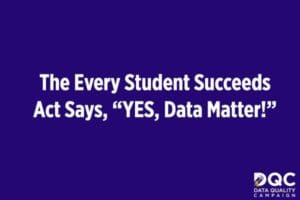With bipartisan support in Congress and President Obama’s signature, the Every Student Succeeds Act (ESSA) has finally reauthorized the Elementary and Secondary Education Act. The new law represents a shift in the nation’s approach to education, but it’s remarkably consistent with its predecessor (No Child Left Behind) in one significant aspect—affirming that data matter to student success.
ESSA preserves the most positive legacy of the No Child Left Behind era—more accurate and transparent data about the performance of all students—and helps states take their efforts to use data in support of student learning to the next level. The following provisions send a strong signal that Congress has been listening to states over the years as they look for support to make data use possible at all levels.
Richer Information on Student Outcomes
Parents and advocates are more empowered than ever with the law’s renewed commitment to ensuring that robust information is publicly available. High-quality public reports will be a critical tool to ensure states are held accountable for the success of every student. To that end, ESSA now requires college enrollment data and any other available data deemed helpful to parents to be included on school report cards. This information shines a brighter light on student outcomes and empowers families in their education decisionmaking.
Smarter Data Disaggregation
ESSA requires states to better track and report how well homeless students, military-connected students, and students in foster care are doing. Further, the US Secretary of Education is directed to help interested states and districts disaggregate data on Asian American and Pacific Islander (AAPI) students to help improve their academic outcomes. Taken together, these provisions help educators and policymakers see these students clearly and target supports to help them.
Spotlight on Data Literacy and Privacy
For the first time, the nation’s primary education law recognizes the importance of student data privacy and training. Data privacy and training related to data literacy are now listed as uses of important grant funds for states and districts. Data privacy laws and policies are critical, but so is ensuring that educators receive the supports and information they need to safeguard data as they use it to support their students.
Evolution of Performance Indicators
After more than a decade of using a single measure to evaluate schools, Congress listened to the field and agreed that multiple measures are indeed necessary to ensure we have a full picture of performance. ESSA’s accountability framework calls for states to draw from a variety of academic and noncognitive indicators as they develop their systems. And with the preservation of annual statewide testing, states will be able to include student growth instead of, or along with, proficiency. This sends a clear signal that stakeholders at all levels don’t want less data, they want better data.
Prioritizing Education Research
The Grants for Education Innovation and Research program will support the development, implementation, and scaling of evidence-based innovations to improve student outcomes—a charge that will require robust state data systems and appropriate access for researchers.
As with most laws, how well these education data provisions ultimately produce meaningful information and spur change will depend on how the law is implemented. What this really means is that while these provisions look great, there is still important work ahead to make sure states use data to make better decisions and to support great teaching and learning at the local level.
Now let’s get to work!


